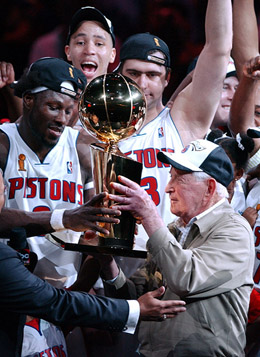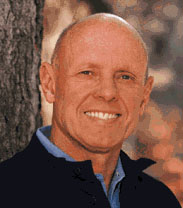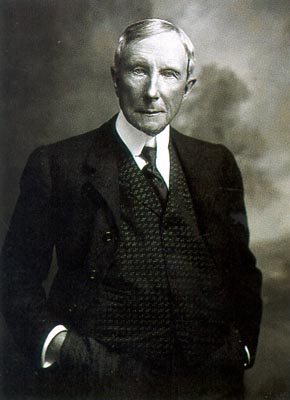Warren Edward Buffett (born August 30, 1930, in Omaha, Nebraska) is an American investor, businessman and philanthropist. He is regarded as one of the world's greatest stock market investors, and is the largest shareholder and CEO of Berkshire Hathaway. With an estimated net worth of around US$62 billion, he was ranked by Forbes as the richest person in the world as of March 5, 2008.
Often called the "Oracle of Omaha," Buffett is noted for his adherence to the value investing philosophy and for his personal frugality despite his immense wealth. His 2006 annual salary was about $100,000, which is on the low side of senior executive remuneration in other comparable companies. He lives in the same house in the central Dundee neighborhood of Omaha that he bought in 1958 for $31,500, today valued at around $700,000.
Buffett is also a noted philanthropist. In 2006, he announced a plan to give away his fortune to charity, with 83% of it going to the Bill & Melinda Gates Foundation. In 2007, Buffett was listed among Time's 100 Most Influential People in The World. He also serves as a member of the board of trustees at Grinnell College.
Source: Wikipedia
Here are the
Success Traits:Warren Buffett BiographyEven Harvard Makes Mistakes:[In 1947, a seventeen year old Warren Buffett graduated from High School. It was never his intention to go to college; he had already made $5,000 delivering newspapers (this is equal to $42,610.81 in 2000). His father had other plans, and urged his son to attend the Wharton Business School at the University of Pennsylvania. Buffett stayed two years, complaining that he knew more than his professors. When Howard was defeated in the 1948 Congressional race, Warren returned home to Omaha and transferred to the University of Nebraska-Lincoln. Working full-time, he managed to graduate in only three years.
Warren Buffett approached graduate studies with the same resistance he displayed a few years earlier. He was finally persuaded to apply to Harvard Business School, which, in the worst admission decision in history, rejected him as "too young". Slighted, Warren applied to Columbia where famed investors Ben Graham and David Dodd taught - an experience that would forever change his life.]
Persistence:[Ben Graham became an idyllic figure to the twenty-one year old Warren Buffett. Reading an old edition of Who's Who, Warren discovered his mentor was the Chairman of a small, unknown insurance company named GEICO. He hopped a train to Washington D.C. one Saturday morning to find the headquarters. When he got there, the doors were locked. Not to be stopped, Buffett relentlessly pounded on the door until a janitor came to open it for him. He asked if there was anyone in the building. As luck (or fate) would have it, there was. It turns out that there was a man still working on the sixth floor. Warren was escorted up to meet him and immediately began asking him questions about the company and its business practices; a conversation that stretched on for four hours. The man was none other than Lorimer Davidson, the Financial Vice President. The experience would be something that stayed with Buffett for the rest of his life. He eventually acquired the entire GEICO company through his corporation, Berkshire Hathaway.]
Even the Best Fail Sometimes:[During these initial years, Warren's investments were predominately limited to a Texaco station and some real estate, but neither were successful. It was also during this time he began teaching night classes at the University of Omaha (something that wouldn't have been possible several months before. In an effort to conquer his intense fear of public speaking, Warren took a course by Dale Carnegie). Thankfully, things changed. Ben Graham called one day, inviting the young stockbroker to come to work for him. Warren was finally given the opportunity he had long awaited.]
More Hard Times:[It was shortly thereafter one of the most profound and upsetting events in Buffett's life took place. At forty-five, Susan Buffett left her husband - in form. Although she remained married to Warren, the humanitarian / singer secured an apartment in San Francisco and, insisting she wanted to live on her own, moved there. Warren was absolutely devastated; throughout his life, Susie had been "the sunshine and rain in my [his] garden". The two remained close, speaking every day, taking their annual two-week New York trip, and meeting the kids at their California Beach house for Christmas get-togethers. The transition was hard for the businessman, but he eventually grew somewhat accustomed to the new arrangement. Susie called several women in the Omaha area and insisted they go to dinner and a movie with her husband; eventually, she set Warren up with Astrid Menks, a waitress.]
A Chronological History of the Oracle of Omaha: 1930-1956Confidence:[1943: Warren declares to a friend of the family that he will be a millionaire by the time he turns thirty, or "[I'll] jump off the tallest building in Omaha."]
Strengthen Your Weaknesses:[1951: Buffett takes a Dale Carnegie public speaking course. Using what he learnt, he began to teach a night class at the University of Nebraska, "Investment Principles". The students were twice his age [he was only 21 at the time].]




















